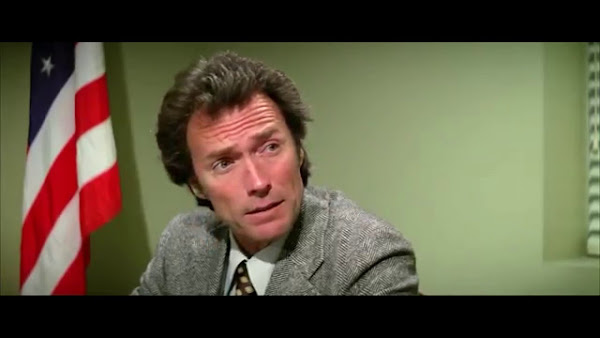Dirty Harry The Enforcer And 1976
It goes without saying that even fairly recent successful Hollywood films couldn't be made today. I've already talked about the Jason Bourne films that put the CIA in a darkly threatening and subversive light that's now a bit too topical. By the same token, the Dirty Harry series starring Clint Eastwood not only couln't be made now, but I wouldn't rule out cancel culture taking DVD copies off the market entirely. But recently I saw the third film in that series, The Enforcer (1976), which I think is by far the best and, like the Bourne films, retrospectively revealing.
The first Dirty Harry flim, which had that title (1971), had a contemporary, San Francisco-based story, dealing with a Zodiac style serial killer. The second, Magnum Force (1973), wasn't so much rooted in current events and dealt with a police vigilante squad. But The Enforcer took a real issue by the horns, a terrorist group made up of upper-class twentysomethings allied with Lumpenproletariat thugs. By 1976, the US had been through several instances of this, via the Weather Undergound, the Symbionese Liberation Army, and other terrorist outbreaks of the period.
The theme of all the Cirty Harry films is Inspector Callahan's integrity, competence, and disregard for red tape, contrasted with the incompetence, cowardice and venality of politicians and the upper echelons of the police department. In this, the character probably comes from the Western genre, rather than detective fiction -- Callahan owes much more to the sheriff in films like High Noon than the disillusioned cop in the film noir The City That Never Sleeps.
The main action in The Enforcer centers on Callahan's investigation of a terrorist raid in which a group seizes a cache of military rockets. Callahan's superior, Captain McKay. eager to curry favor with the mayor and department brass, insists that a black militant group is responsible. Callahan is skeptical and meets Big Ed Mustapha, leader of the black militant group. He convinces Mustapha that, as men of integrity, they're actually on the same side, and Mustapha provides him with information on the actual terrorists, who by implication are rich white kids allied with pimps and punks.
However, Captain McKay is running his own inept investigation at cross-purposes to Callahan and arrests Mustapha and the other black militants. McKay attempts to take credit for solving the case and tries to engineer a public commendation from the mayor. However, the actual terrorists kidnap the mayor and spirit him out to Alcatraz Island. McKay and the department brass readily agree to the terrorists' demands to secure the mayor's release, but Callahan, already on the scene in Alcatraz, kills the terrorist ringleader before McKay and the police brass can arrive to surrender.
Like the Bourne films, The Enforcer is unintentionally insightful in a way that reverberates through subsequent decades. Referring to the rich white terrorists and the social tensions they inflame and exploit, Callahan speaks several times of a "war" that's under way, with the implication that cowardly politicians and their bureaucratic enablers allow it to continue. Thinking forward to the BLM riots of 2020, it's nard not to conclude that nothing's changed. There's a war, with the elites and entrenched bureaucrats trying to confuse the rest of us about who's on what side.
This in turn makes me wonder if 1976 is a year we should pay closer attention to. Robert Barnes thinks we should look to the election years 1824 and 1876. Others say look to 2000 and Bush v Gore. Victor Davis Hanson recently suggested 1968, but if you think about it, 1968 was the start of the trends that led to 1976, and there's a lot about The Enforcer and what it says about 1976 that speaks to us today.
Just for starters, 1976 was the election held in the wake of the Watergate scandal, Nixon's resignation, and Ford's pardon of Nixon, all of which led to the election of the incompetent Jimmy Carter. And hasn't it gradually come out that in Watergate, the FBI was the behind-the-scenes player, with the deep state Deep Throat pulling a lot of the strings, working closely with uber-establishment media? There's a lot to reflect on here.


0 Comments:
Post a Comment
Subscribe to Post Comments [Atom]
<< Home